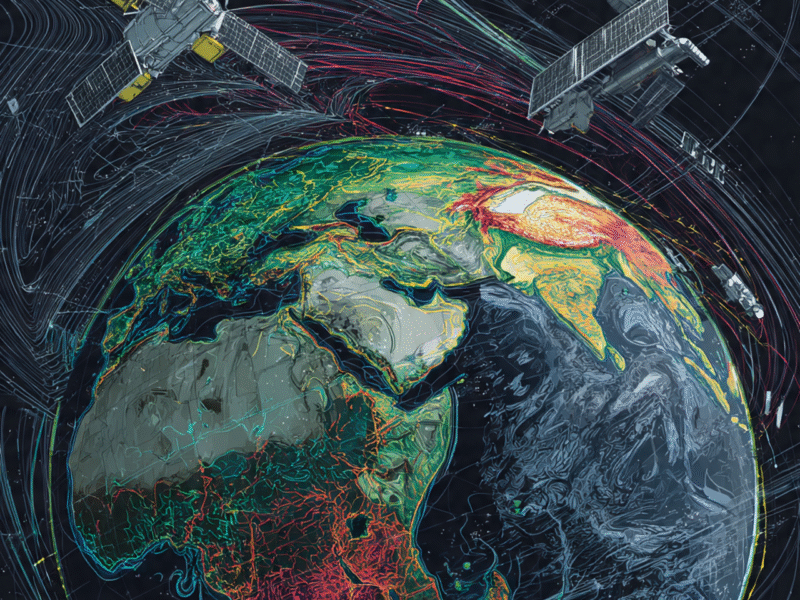International Cooperation in Space Exploration: One Hand of Humanity
Introduction: One Hand of Humanity, A Journey to Space
Some sixty years ago, when the first man landed on the moon, he was an American citizen, but his feat was a joint victory of humanity. Today we have entered an era where no country, no matter how powerful, can undertake this vast journey of space exploration alone. International cooperation is no longer just an option, it has become an inevitable necessity. It is the only bridge that can take us beyond the boundaries of the earth and connect us to the infinite expanses of the universe. This article will take you to this bridge, where we will see how different nationalities, cultures and languages are coming together for a single goal. This is not just a science story, it is a new story of human harmony, mutual respect, and shared prosperity, with each chapter full of surprises.
◉ You Can’t Go Far Alone: Sharing Resources
Space exploration is perhaps the most expensive endeavor in the world. Sending a small satellite into space costs hundreds of millions of dollars, while a rover to land on Mars costs billions of dollars. No country, be it the United States or China, can consistently and endlessly spend money on such projects. International cooperation is the best solution to this problem. When several countries work together on a project, not only is the financial burden light, but each country offers the best of its expertise. For example, in the International Space Station (ISS), the United States built the laboratories, Russia provided the transport system, Japan provided the research module, and Europe provided the scientific instruments. This is a family where each member is running the household according to their ability, and the result is in front of everyone.
◉ Knowledge Bouquet: Research and Technological Development
When scientists and engineers from different countries come together, their ideas, experiences, and perspectives also come together. This scientific collaboration gives new paths to inventions and discoveries. The invention of one country is useful to another country. For example, solar panels made by the European Space Agency (ESA) are still used on many NASA missions today. The robotic arm (Canadarm) made by Canada has done hundreds of tasks since the time of the space shuttle. This mutual cooperation not only saves time but also gives each new generation the opportunity to build on the achievements of the previous generation, which increases the speed of development many times over.
◉ From the Battlefield to the Research Field: Promoting Peace
During the Cold War, the space race was actually a military race. Today’s era is completely different. On the International Space Station, the United States and Russia, who have political differences on Earth, are working peacefully under the same roof. Space exploration has proven that if humans want to, they can forget their differences and unite for a higher purpose. This is a practical example that paves the way for establishing peace on Earth as well. When a team of scientists hoists the flag of success together, it sends a message that humanity is not the domain of any one country or nation.
◉ Space Solutions to Earth’s Problems: Global Prosperity
The benefits of space exploration are not limited to space. Its numerous benefits also extend to our earthly lives. We need space technology to combat global problems such as climate change, natural disasters, food and water shortages. Through satellites, we can predict storms, reduce flood damage, and monitor water reserves. When this data and technology are shared with all countries, it benefits all of humanity. Satellite data produced by a developed country can warn a poor country of an impending storm and save thousands of lives. This is true global prosperity.
◉ A Beacon for a New Generation: Education and Inspiration
When young people see scientists from different countries working together to land a rover on Mars or take the first picture of a black hole, a sense of excitement rises in their hearts. International space projects are a source of inspiration for young people around the world. They teach them that success can be achieved beyond prejudice and narrow-mindedness. They attract the new generation to science, technology, engineering and mathematics (STEM) education, which is fundamental to the development of any country.
◉ Space Laws: A Fair System
Space is a region that is not owned by any one country. Therefore, it is important to create rules for its use that are fair to all. Only through international cooperation can we create a comprehensive and fair legal system for space debris management, the use of space resources, and human activities on other planets. This system will ensure that space resources are not only occupied by a few powerful countries, but also benefit future generations.
◉ Collective Journey to the Moon and Mars: A Common Destination
Establishing permanent settlements on the Moon or landing humans on Mars are goals that are not the sole responsibility of any one country. NASA’s Artemis program, which aims to return to the Moon, is actually an international partnership involving European, Japanese, Canadian, and other countries. Similarly, China and Russia also plan to build a research station on the Moon together. These collective efforts will enable us to reach the other corners of the solar system by the end of this century.
◉ Building a Space Economy: A New Economic Model
Space exploration is giving rise to a new global economy, called the “space economy.” It includes sectors such as satellite communications, space tourism, asteroid mining, and manufacturing in space. International cooperation will make this economy sustainable and fair. It will also allow developing countries to join the race, which will not only boost global trade but also create new job opportunities around the world.
◉ Conclusion: In the Same Boat
Ultimately, we need to understand that we are all inhabitants of the same planet, sailing on a fragile and beautiful ship in a small corner of the universe. Space exploration makes us realize how small our mutual conflicts and differences are. International space cooperation is not just a means to reach the moon and stars, it inspires us to build a better, peaceful and cooperative Earth. It is the guarantee of our common future.


